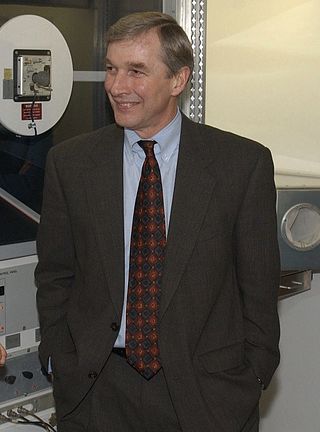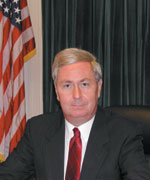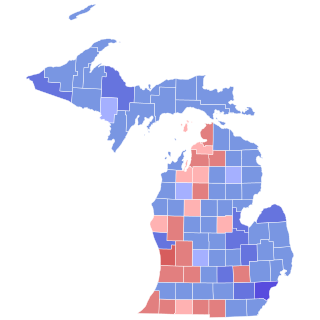Related Research Articles

The governor of Michigan is the head of state, head of government, and chief executive of the U.S. state of Michigan. The current governor is Gretchen Whitmer, a member of the Democratic Party, who was inaugurated on January 1, 2019, as the state's 49th governor. She was re-elected to serve a second term in 2022. The governor is elected to a 4-year term and is limited to two terms.

John Mathias Engler is an American politician, lawyer, businessman, and lobbyist who served as the 46th governor of Michigan from 1991 to 2003. Considered one of the country's top lobbyists, he is a member of the Republican Party.
Cable-Satellite Public Affairs Network is an American cable and satellite television network, created in 1979 by the cable television industry as a nonprofit public service. It televises proceedings of the United States federal government and other public affairs programming. C-SPAN is a private, nonprofit organization funded by its cable and satellite affiliates. It does not have advertisements on any of its networks or radio stations, nor does it solicit donations or pledges. The network operates independently; the cable industry and the U.S. Congress have no control over its programming content.

Jennifer Mulhern Granholm is a Canadian-American lawyer, educator, author, political commentator, and politician. Since 2021, she has served as the 16th United States secretary of energy. A member of the Democratic Party, she previously served as the 47th governor of Michigan from 2003 to 2011, and as the 51st attorney general of Michigan from 1999 to 2003, as the first woman to hold both offices.

Richard Posthumus is an American businessman, and politician. He was the 61st lieutenant governor of Michigan and majority leader of the Michigan Senate. In 2002, he was the unsuccessful Republican nominee for Governor of Michigan.

James Allan Barcia is an American Democratic politician from Michigan. He has served successively in the Michigan House of Representatives, the Michigan Senate, the United States House of Representatives and then again the Michigan Senate, from which he was term-limited in January 2011. He has served as County Executive of Bay County, Michigan, since January, 2017.
WTVS is a PBS member television station in Detroit, Michigan, United States, owned by the Detroit Educational Television Foundation. Its main studios are located at the Riley Broadcast Center and HD Studios on Clover Court in Wixom, with an additional studio at the Maccabees Building in Midtown Detroit. The station's transmitter is located at 8 Mile and Meyers Road in Oak Park. WTVS partners with the Stanley and Judith Frankel Family Foundation in the management of classical and jazz music station WRCJ-FM (90.9).
WKAR-TV is a PBS member television station licensed to East Lansing, Michigan, United States, serving the Central Lower Peninsula of Michigan. The station is owned by Michigan State University and operated as part of its Broadcasting Services Division. WKAR-TV's studios are located in the Communication Arts and Sciences Building, at the southeast corner of Wilson and Red Cedar Roads on the MSU campus in East Lansing. Its transmitter is located on Kinawa Road in Meridian Township, Michigan between East Lansing and Williamston.

The Florida Channel is a government-access television network operated by Florida State University's WFSU-TV and the Florida State Legislature. The channel is currently carried by 46 cable TV systems throughout the State of Florida either on a part-time or full-time basis as well as through up to 18 live Internet streams and via satellite. The station operates 24 hours a day though its normal broadcast schedule starts at 6:00 a.m. ET and ends at 6:00 p.m. ET with the day's programming repeated in a loop throughout the night. The Florida Channel also airs on the digital subchannels of most Florida PBS member stations and on some public independent and local cable-only stations.

The Michigan State Capitol is the building that houses the legislative branch of the government of the U.S. state of Michigan. It is in the portion of the state capital of Lansing which lies in Ingham County. The present structure, at the intersection of Capitol and Michigan Avenues, is a National Historic Landmark that houses the chambers and offices of the Michigan Legislature as well as the ceremonial offices of the Governor of Michigan and Lieutenant Governor. Historically, this is the third building to house the Michigan government.

William Duncan Schuette is an American lawyer and politician who served as the 53rd attorney general of Michigan from 2011 to 2019. He was the unsuccessful Republican nominee for Senate in 1990 and for Governor of Michigan in the 2018 gubernatorial election.
The Michigan Department of Environment, Great Lakes, and Energy (EGLE), formerly Michigan Department of Environmental Quality, is a principal department of the U.S. state of Michigan for environmental issues. The department was created in 1995.

WisconsinEye is a non-profit, private public affairs cable network in the state of Wisconsin, United States. The network airs gavel-to-gavel coverage of the Wisconsin Legislature, including floor sessions of the Wisconsin State Assembly and Wisconsin State Senate, plus committee meetings and other programs of state interest such as panels, town halls, and programs about state history. The coverage is available live both on the cable network as well as through the WisconsinEye website.

The Connecticut Network, also known as CT-N, is a 24-hour Cable TV and internet streaming service that provides coverage of Connecticut state government and public affairs. Launched in 1999, CT-N is managed in partnership with the Connecticut General Assembly and The Connecticut Democracy Center. While other past initiatives for covering official proceedings of Connecticut's State Legislature existed prior to 1999, CT-N represents the first 24-hour service focused on gavel-to-gavel coverage of all three branches of Connecticut state government and has run continuously since its launch. The network's scope of operations has expanded and contracted over the years and has at different points in time also included coverage of Connecticut elections, live anchored broadcasts and Election Night and Legislative Opening Day and a week-in-review program titled CT-N Capitol Report which debuted on Friday nights and ran continuously for 13 years. The network's focus on complete and balanced coverage without commercial interruption, editing or commentary has positioned it to be a window on Connecticut government and policy for many watershed events since 1999, including one governor's impeachment inquiry, political and policy responses to the 9/11 attacks and the Sandy Hook school shooting, as well as daily press briefings from the Governor's Office at the height of the COVID-19 pandemic.

Michigan has a republican form of government with three branches of government: the executive branch consisting of the governor of Michigan and the other independently elected constitutional officers; the legislative branch consisting of the House of Representatives and Senate; and the judicial branch consisting of the one court of justice. The state also allows direct participation of the electorate by initiative, referendum, recall, and ratification.
The Oregon Channel was a former public affairs television network in the U.S. state of Oregon. It was operated by a consortium consisting of Oregon Public Broadcasting, Southern Oregon Public Television, the Oregon Legislative Assembly, the Oregon University System and the Oregon Public Affairs Network (OPAN). It was carried on most cable television systems throughout Oregon either on a part-time or full-time basis as well as on the Internet. The station operated 24 hours a day.
The Michigan Department of Technology, Management, and Budget, formerly Michigan Department of Management and Budget, is a principal department of the government of Michigan responsible for various support functions within the government.

Robert P. Young Jr. is a former justice of the Michigan Supreme Court. Young was first appointed to the Michigan Supreme Court in 1999, elected in 2000 and 2002, and again won reelection in 2010 for a term ending in 2019. Justice Young announced he would be retiring from the court at the end of April 2017. Young is a self-described judicial traditionalist or textualist. In June 2017, Young announced his intentions to run against Debbie Stabenow in the 2018 senate race, but later dropped out saying he could not raise enough money for his campaign.

The 2012 United States Senate election in Michigan was held on November 6, 2012, alongside the 2012 United States presidential election, other elections to the United States Senate in other states, as well as elections to the United States House of Representatives and various state and local elections.

The 2014 United States Senate election in Michigan was held on November 4, 2014, to elect a member of the United States Senate to represent the State of Michigan, concurrently with the election of the governor of Michigan, as well as other elections to the United States Senate in other states and elections to the United States House of Representatives and various state and local elections.
References
- 1 2 3 4 5 Scott, T. (August 16, 2008). "MI Tube". Dome. No. August 2008. Scott Publishing LLC. Retrieved October 10, 2016.
- 1 2 3 4 5 6 7 8 Trevarthen, Bill (August 16, 2011). "Exit Interview". Dome. Scott Publishing LLC. Retrieved October 10, 2016.
- ↑ "Panel wants to block state television network". The Argus-Press. AP. March 1, 1994. p. 12. Retrieved October 10, 2016.
- ↑ "Michigan Supreme Court action to appear online". Kalamazoo Gazette. MLive Media Group. 30 July 2009. Retrieved 2009-08-07.
- ↑ Carpenter, John (July 27, 2001). "Expelled Senator To Run Again". New York Times. Retrieved October 10, 2016.
- ↑ Anders, Melissa (December 14, 2012). "MGTV, Michigan's government cable station, to be replaced with online format". Mlive.cm. Mlive Media Group. Retrieved October 10, 2016.
- ↑ Andrews, Chris. "Bullets and Scandal Gave Birth to Political History Group". Dome Magazine Blog. Scott Publishing, LLC. Retrieved October 10, 2016.